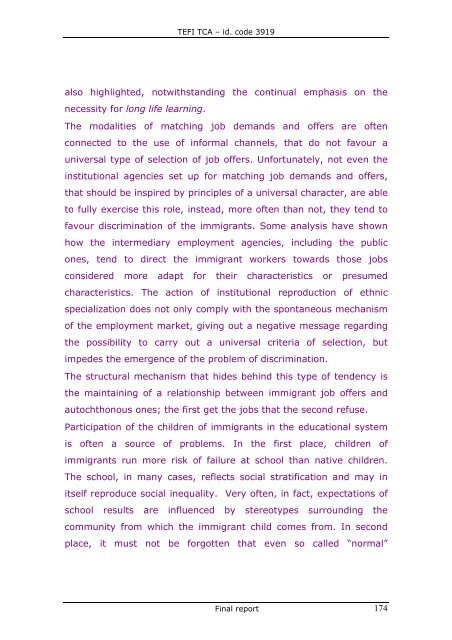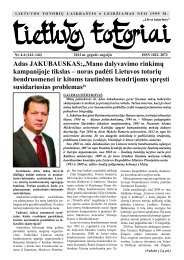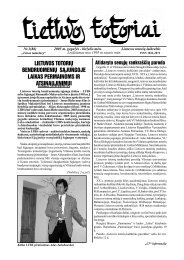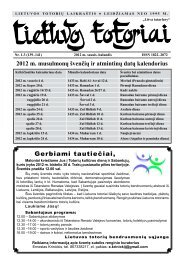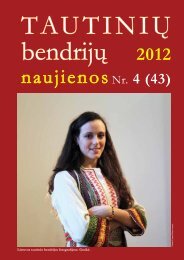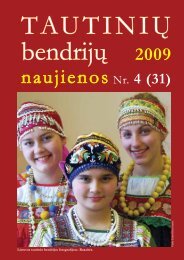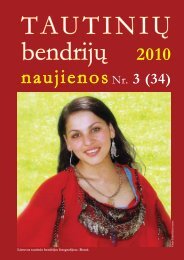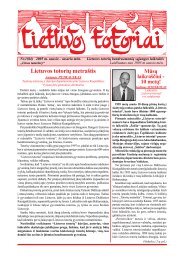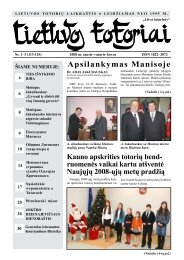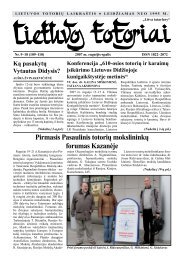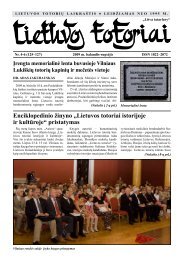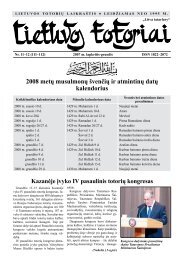- Page 1:
TEFI TCA - id. code 3919INDEXINTROD
- Page 4 and 5:
TEFI TCA - id. code 3919CHAPTER 3:
- Page 6 and 7:
TEFI TCA - id. code 3919INTRODUCTIO
- Page 8 and 9:
TEFI TCA - id. code 3919of loyalty
- Page 10 and 11:
TEFI TCA - id. code 3919worse model
- Page 12 and 13:
TEFI TCA - id. code 3919improving c
- Page 14 and 15:
TEFI TCA - id. code 3919clearly sho
- Page 16 and 17:
TEFI TCA - id. code 3919CHAPTER 1BA
- Page 18 and 19:
TEFI TCA - id. code 3919sovereignty
- Page 20 and 21:
TEFI TCA - id. code 3919food, cloth
- Page 22 and 23:
TEFI TCA - id. code 3919collective
- Page 24 and 25:
TEFI TCA - id. code 3919This remain
- Page 26 and 27:
TEFI TCA - id. code 3919some partne
- Page 28 and 29:
TEFI TCA - id. code 39191.2.2 TE.S.
- Page 30 and 31:
TEFI TCA - id. code 3919of possible
- Page 32 and 33:
TEFI TCA - id. code 39191.2.3 The e
- Page 34 and 35:
TEFI TCA - id. code 3919as the econ
- Page 36 and 37:
TEFI TCA - id. code 3919the network
- Page 38 and 39:
TEFI TCA - id. code 3919training an
- Page 40 and 41:
TEFI TCA - id. code 39191.3 Common
- Page 42 and 43:
TEFI TCA - id. code 3919schemes and
- Page 44 and 45:
TEFI TCA - id. code 3919is needed i
- Page 46 and 47:
TEFI TCA - id. code 3919candidates
- Page 48 and 49:
TEFI TCA - id. code 39192.2 The Ger
- Page 50 and 51:
TEFI TCA - id. code 3919areas of te
- Page 52 and 53:
TEFI TCA - id. code 3919process be
- Page 54 and 55:
TEFI TCA - id. code 3919aimed at in
- Page 56 and 57:
TEFI TCA - id. code 3919good”. It
- Page 58 and 59:
TEFI TCA - id. code 3919- Wire bend
- Page 60 and 61:
TEFI TCA - id. code 3919- Select an
- Page 62 and 63:
TEFI TCA - id. code 3919exercises a
- Page 64 and 65:
TEFI TCA - id. code 3919- strengthe
- Page 66 and 67:
TEFI TCA - id. code 3919residents o
- Page 68 and 69:
TEFI TCA - id. code 3919on the grou
- Page 70 and 71:
TEFI TCA - id. code 3919to make the
- Page 72 and 73:
TEFI TCA - id. code 3919since 2002.
- Page 74 and 75:
TEFI TCA - id. code 3919tendency of
- Page 76 and 77:
TEFI TCA - id. code 3919forecasts.
- Page 78 and 79:
TEFI TCA - id. code 3919and low voc
- Page 83 and 84:
TEFI TCA - id. code 3919well-timed
- Page 85 and 86:
TEFI TCA - id. code 3919creative ac
- Page 87 and 88:
TEFI TCA - id. code 3919interperson
- Page 90 and 91:
TEFI TCA - id. code 3919as well as
- Page 92 and 93:
TEFI TCA - id. code 3919the job bei
- Page 94 and 95:
TEFI TCA - id. code 3919interested
- Page 96 and 97:
TEFI TCA - id. code 3919That orient
- Page 98 and 99:
TEFI TCA - id. code 3919a Document
- Page 100 and 101:
TEFI TCA - id. code 3919Il percorso
- Page 102 and 103:
TEFI TCA - id. code 39191l’utente
- Page 104 and 105:
TEFI TCA - id. code 39192.4.7 Model
- Page 106 and 107:
TEFI TCA - id. code 3919must be aid
- Page 108 and 109:
TEFI TCA - id. code 3919analysis. T
- Page 110 and 111:
TEFI TCA - id. code 3919large typol
- Page 112 and 113:
TEFI TCA - id. code 3919Planning is
- Page 114 and 115:
TEFI TCA - id. code 3919the French
- Page 116 and 117:
TEFI TCA - id. code 3919A last inte
- Page 118 and 119:
TEFI TCA - id. code 3919Summary tab
- Page 120 and 121:
TEFI TCA - id. code 39192.4.13 Phas
- Page 122 and 123:
TEFI TCA - id. code 39192.4.15 Outp
- Page 124 and 125: TEFI TCA - id. code 3919on the eval
- Page 126 and 127: TEFI TCA - id. code 3919Therefore,
- Page 128 and 129: TEFI TCA - id. code 3919his entire
- Page 130 and 131: TEFI TCA - id. code 39192.4.24 The
- Page 132 and 133: TEFI TCA - id. code 39192.4.27 Asse
- Page 134 and 135: TEFI TCA - id. code 3919also identi
- Page 136 and 137: TEFI TCA - id. code 3919the deferme
- Page 138 and 139: TEFI TCA - id. code 3919Exploitatio
- Page 140 and 141: TEFI TCA - id. code 3919the awarene
- Page 142 and 143: TEFI TCA - id. code 3919The activit
- Page 144 and 145: TEFI TCA - id. code 3919The role is
- Page 146 and 147: TEFI TCA - id. code 3919The migrant
- Page 148 and 149: TEFI TCA - id. code 3919in view of
- Page 150 and 151: TEFI TCA - id. code 3919CHAPTER 3GL
- Page 152 and 153: TEFI TCA - id. code 3919Gastarbeite
- Page 154 and 155: TEFI TCA - id. code 3919In 1973 alr
- Page 156 and 157: TEFI TCA - id. code 3919MigrantasIm
- Page 158 and 159: TEFI TCA - id. code 3919Ethnische M
- Page 160 and 161: TEFI TCA - id. code 3919Minoranze e
- Page 162 and 163: TEFI TCA - id. code 3919For the fir
- Page 164 and 165: TEFI TCA - id. code 3919Discriminat
- Page 166 and 167: TEFI TCA - id. code 3919giving a ge
- Page 168 and 169: TEFI TCA - id. code 3919antidiscrim
- Page 170 and 171: TEFI TCA - id. code 3919revolve aro
- Page 172 and 173: TEFI TCA - id. code 3919With regard
- Page 176 and 177: TEFI TCA - id. code 3919some rights
- Page 178 and 179: TEFI TCA - id. code 3919identifying
- Page 180 and 181: TEFI TCA - id. code 3919The racism
- Page 182 and 183: TEFI TCA - id. code 3919Durkheim an
- Page 184 and 185: TEFI TCA - id. code 3919(position o
- Page 186 and 187: TEFI TCA - id. code 3919Asimiliacij
- Page 188 and 189: TEFI TCA - id. code 3919may be show
- Page 190 and 191: TEFI TCA - id. code 3919Total acces
- Page 192 and 193: TEFI TCA - id. code 3919The hidden
- Page 194 and 195: TEFI TCA - id. code 3919the foreign
- Page 196 and 197: TEFI TCA - id. code 3919protection
- Page 198 and 199: TEFI TCA - id. code 3919of some ant
- Page 200 and 201: TEFI TCA - id. code 3919communities
- Page 202 and 203: TEFI TCA - id. code 3919programs in
- Page 204 and 205: TEFI TCA - id. code 3919Development
- Page 206 and 207: TEFI TCA - id. code 3919Having eval
- Page 208 and 209: TEFI TCA - id. code 3919DP PAMIR SO
- Page 210 and 211: TEFI TCA - id. code 3919Salzgitter
- Page 212 and 213: TEFI TCA - id. code 3919same hold t
- Page 214 and 215: TEFI TCA - id. code 3919social life
- Page 216 and 217: TEFI TCA - id. code 3919Anyway, the
- Page 218 and 219: TEFI TCA - id. code 3919"Equal: pro
- Page 220 and 221: TEFI TCA - id. code 3919leaders and
- Page 222 and 223: TEFI TCA - id. code 3919enterprises
- Page 224 and 225:
TEFI TCA - id. code 3919comparative
- Page 226 and 227:
TEFI TCA - id. code 3919the problem
- Page 228 and 229:
TEFI TCA - id. code 3919information
- Page 230 and 231:
TEFI TCA - id. code 3919• Adult e
- Page 232 and 233:
TEFI TCA - id. code 39197. Are ther
- Page 234 and 235:
TEFI TCA - id. code 39192. identify
- Page 236 and 237:
TEFI TCA - id. code 3919partners, u
- Page 238 and 239:
TEFI TCA - id. code 3919b) The “i
- Page 240 and 241:
TEFI TCA - id. code 3919a) Rational
- Page 242 and 243:
TEFI TCA - id. code 39195.1.9 e-mai
- Page 244 and 245:
TEFI TCA - id. code 3919d) ITALY -
- Page 246 and 247:
TEFI TCA - id. code 39195.2.2 Evalu
- Page 248 and 249:
TEFI TCA - id. code 3919- Which of
- Page 250 and 251:
TEFI TCA - id. code 3919contributed
- Page 252 and 253:
TEFI TCA - id. code 3919I will end
- Page 254 and 255:
TEFI TCA - id. code 3919models …
- Page 256 and 257:
TEFI TCA - id. code 3919- prepare
- Page 258 and 259:
TEFI TCA - id. code 3919May 2006 in
- Page 260 and 261:
TEFI TCA - id. code 3919II,2), a se
- Page 262 and 263:
TEFI TCA - id. code 3919question, w
- Page 264 and 265:
TEFI TCA - id. code 3919quality and
- Page 266 and 267:
TEFI TCA - id. code 39195.2.7 Appen
- Page 268 and 269:
TEFI TCA - id. code 3919b) The Fren
- Page 270 and 271:
TEFI TCA - id. code 3919c) The Ital
- Page 272 and 273:
TEFI TCA - id. code 3919b. survey o
- Page 274 and 275:
TEFI TCA - id. code 3919Sensitizing
- Page 276 and 277:
TEFI TCA - id. code 3919objective c
- Page 278 and 279:
TEFI TCA - id. code 3919enterprises
- Page 280 and 281:
TEFI TCA - id. code 3919make German
- Page 282 and 283:
TEFI TCA - id. code 39193) In Peine
- Page 284 and 285:
TEFI TCA - id. code 3919- the local
- Page 286 and 287:
TEFI TCA - id. code 3919Lithuanian
- Page 288 and 289:
TEFI TCA - id. code 3919Discussion:
- Page 290 and 291:
TEFI TCA - id. code 3919- on-going
- Page 292 and 293:
TEFI TCA - id. code 3919(4) All in
- Page 294 and 295:
TEFI TCA - id. code 3919It was prop
- Page 296 and 297:
TEFI TCA - id. code 39191. Activiti
- Page 298 and 299:
TEFI TCA - id. code 3919During the
- Page 300 and 301:
TEFI TCA - id. code 3919were needed
- Page 302 and 303:
TEFI TCA - id. code 3919Lithuanian
- Page 304 and 305:
TEFI TCA - id. code 3919mail) will
- Page 306 and 307:
TEFI TCA - id. code 39192. Ordinary
- Page 308 and 309:
TEFI TCA - id. code 3919presentatio
- Page 310 and 311:
TEFI TCA - id. code 3919Conclusions
- Page 312 and 313:
TEFI TCA - id. code 3919which has b
- Page 314 and 315:
TEFI TCA - id. code 3919history and
- Page 316:
TEFI TCA - id. code 3919it’s real


